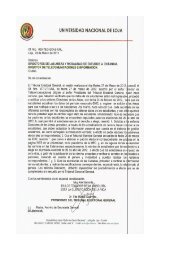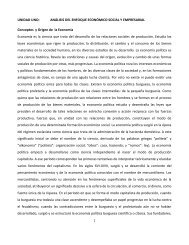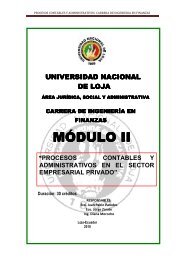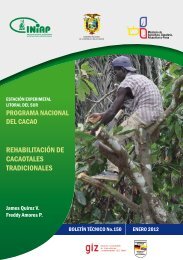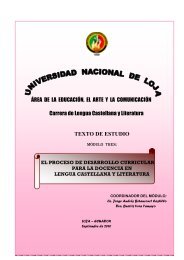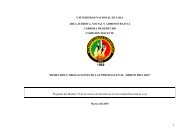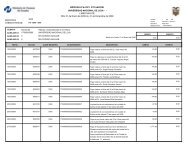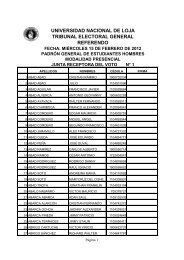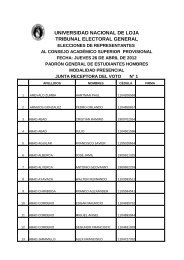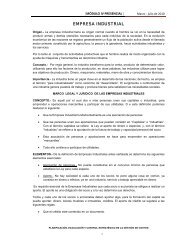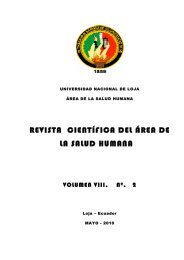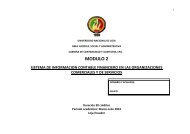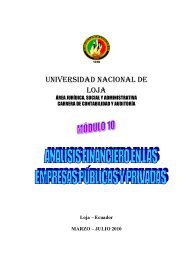module 5 planning of the english language teaching-learning process
module 5 planning of the english language teaching-learning process
module 5 planning of the english language teaching-learning process
Create successful ePaper yourself
Turn your PDF publications into a flip-book with our unique Google optimized e-Paper software.
UNIVERSIDAD NACIONAL DE LOJA<br />
Área de la Educación el Arte y la Comunicación<br />
English Language Career<br />
<br />
<br />
<br />
examples. So when checking a <strong>language</strong> item, we should try to look at more<br />
than one reference resource.<br />
Language changes, as new words appear and people stop using some older<br />
words. Grammatical usage, too, changes slowly over time. One way to keep<br />
up to date is to use <strong>the</strong> most recently published grammar books and<br />
dictionaries.<br />
Dictionaries on CD-ROM have many extra features, such as practice<br />
activities,<br />
We can learn a great deal from o<strong>the</strong>r teachers' experiences. Many teachers'<br />
magazines include regular articles by teachers describing successful<br />
lessons <strong>the</strong>y have taught. It may be easier to visit websites than to find <strong>the</strong><br />
books and articles we need. There are many sites on <strong>the</strong> Internet where we<br />
can find free resources such as lesson plans, worksheets (pages with tasks<br />
and exercises on <strong>the</strong>m that a teacher gives to learners during a lesson) and<br />
ideas for <strong>teaching</strong>. Some sites also <strong>of</strong>fer simple programs for making<br />
classroom resources, such as crosswords and gap-fill exercises. The best<br />
way to find <strong>the</strong>se materials is to visit one <strong>of</strong> <strong>the</strong> sites that has lists <strong>of</strong> links to<br />
useful <strong>teaching</strong> resources on <strong>the</strong> Internet.<br />
FOLLOW-UP ACTIVITY<br />
Try to find resources 1-10 below. Then decide which type <strong>of</strong> resource (A-D)<br />
<strong>the</strong>y are.<br />
1. A-Z <strong>of</strong> English Grammar and Usage by Ge<strong>of</strong>frey Leech, Pearson<br />
Education Ltd 2001<br />
2. Cambridge Learner's Dictionary, Cambridge University Press 2001<br />
3. Discussions That Work by Penny Ur, Cambridge University Press 1981<br />
4. Planning from Lesson to Lesson by Tessa Woodward and Seth<br />
Lindstromberg, Pearson Education Ltd 1995<br />
5. http://wwwruthvilmi.net/hut/LangHelp/Grarnmar<br />
6. Working with Words by Ruth Gairns and Stuart Redman, Cambridge<br />
University Press 1986<br />
7. http://www.preschookainbow.org<br />
8. Motivating High-Level Learners by David Cranmer, Pearson Education<br />
Ltd 1996<br />
9. Five-Minute Activities by Penny Ur and Andrew Wright, Cambridge<br />
University Press 1992.<br />
10. http://www.puzzlemaker.com<br />
A. Language reference resources<br />
B. ideas for <strong>planning</strong> lessons<br />
C. resources for teachers and learners producing <strong>the</strong>ir own materials<br />
D. materials for very young learners<br />
REFLECTION<br />
1 What were <strong>the</strong> reference resources you used when you were studying<br />
English? Do <strong>the</strong>y still help you?<br />
[Escribir texto] Página 77



